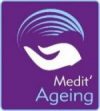Mental training for emotion regulation and stress reduction through meditation practice has received increased interest over the last years. This approach is particularly adapted to our contemporary society and more specifically to ageing populations where sleep disturbances, stress, depression and cognitive decline are significant drivers of reduced quality of life. Hence, meditation training might be able to counteract the negative impact of these psycho-affective and lifestyle risk factors for Alzheimer’s disease.

The Silver Santé Study (official name MEDIT-AGEING) is a 7 M€ H2020 Project funded by the European Commission, led by Inserm, coordinated by Gaël Chételat and involving 11 partners in 6 European countries.
www.medit-ageing.eu
It is the largest meditation study in ageing worldwide, and includes a set of complementary measures allowing to investigate all different aspects of ageing and Alzheimer’s biomarkers. Findings should lead to a better understanding the impact of meditation training but also to unravel the underlying mechanisms as state of the art original techniques are used to further our understanding of the cognitive (attentional) versus affective (emotional regulation) dimensions of meditation training.
The main objectives of Silver Santé Study are to improve the understanding and early diagnosis of Alzheimer’s disease, gain insights on the impact of lifestyle factors, and to assess comprehensively the effects and mechanisms of action of two non-pharmacological interventions (meditation and cognitive training) on mental health and wellbeing in older people.
For this purpose, Silver Santé Study carried out 2 clinical trials.
SCD-Well assessed the effect of short-term interventions on behavioural measures mainly (Marchant et al., Alz Dement, 2018). This trial was conducted in four centres in four different countries (UK, Germany, Spain and France). Recruitment, enrolment, and data acquisition were performed for 147 patients recruited from memory clinics and presenting some level of Subjective Cognitive Decline (SCD). They were randomized to either the meditation or health education condition. The intervention lasted for eight weeks, and the effects were measured just after the intervention and 6 months later. The primary outcome paper reported that the mindfulness was not superior to a health education intervention in reducing subclinical anxiety symptoms in older adults with SCD. A sustained reduction in anxiety symptoms was observed in both groups, which suggests that subclinical anxiety symptoms in older adults with SCD are modifiable (Marchant et al., Psychother Psychosom, 2021).
AGE-WELL assessed the effects of 18-month interventions in cognitively intact older adults (Poisnel et al., Alz Dement, 2018), and of long-term meditation in expert meditators (Lutz et al., Alz Dement, 2018), on both behavioral and biological measures. These measures included blood sample analyses, sleep and neuroimaging data. The analyses were split into two parts, the first one measuring changes before and after intervention, i.e., between baseline and 18-month follow-up, in the cognitively intact older adults and the second one comparing data of expert meditators to those of cognitively intact older adults. Recruitment, enrolment, and data acquisition were performed for 136 participants in Caen, France. The primary outcome paper from Age-Well trial confirms the feasibility of meditation and foreign language training in elderly, with high adherence and very low attrition, and shows positive behavioral effects of meditation that were not reflected on volume, and not significantly on perfusion, of target brain areas (Chételat, Lutz et al., JAMA Neurol, 2022). Future analyses on secondary outcomes will determine the measures most sensitive to meditation training, and the factors associated with responsiveness to the intervention.

Figure : SCD-Well and Age-Well trial designs
More than 20 papers have already been published in high-rank peer reviewed journals.
Following the European Commission recommendations, all groups participating in the H2020 MEDIT-AGEING / SILVER SANTE STUDY project have agreed on a policy for sharing AGE-WELL and SCD-WELL trial data.
Researchers interested in accessing these data are invited to consult the data access procedure available here:
They can then download and complete the data access request form available here: [insert link to access form], and send the signed document to:
